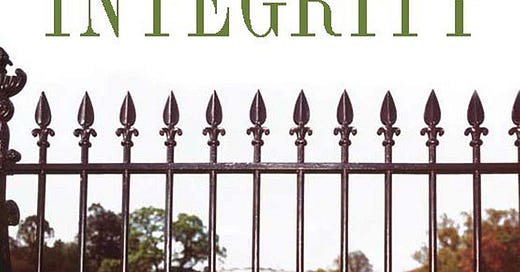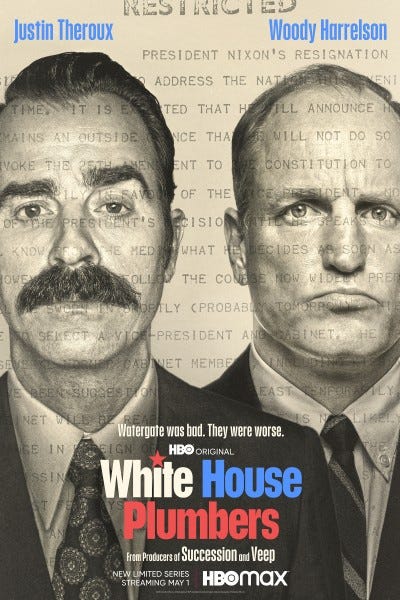Watergate For Laughs
How Egil "Bud" Krogh's Book "Integrity" became HBO's "White House Plumbers."
“During seven weeks of secret work in 1971, my group and I undermined the foundations of Richard Nixon’s presidency…For thirty-five years I have pondered the reasons why I committed a serious crime as co-director of the Plumbers.”
-- from the introduction to Integrity: Good People, Bad Choices, and Life Lessons from the White House (PublicAffairs, 2007)
This spring, HBO presented a five-part miniseries called White House Plumbers, led by David Mandel, who was the showrunner for Julia Louis-Dreyfus’s Veep and was also a producer for Curb Your Enthusiasm and Seinfeld – quite the impressive comic pedigree.
Each episode featured a prominent credit noting that the series was based in part on Egil “Bud” Krogh’2007 book, which he co-wrote with his son Matthew. What was an earnest reflection on crimes committed in the 1970s has evolved into modern-day opera bouffe – history as slapstick.
The saga of the ex-CIA operative E. Howard Hunt and the former FBI agent G. Gordon Liddy’s exploits as leaders of the Special Investigations Unit – the Plumbers – established by Nixon’s close aides John Ehrlichman and Charles Colson to plug “national security” leaks, which morphed into the break-in at the Democratic National Committee’s Watergate headquarters, a massive coverup, jail time for Krogh and many others, and a presidential resignation followed by a controversial pardon, is now an amusement.
The series is essentially faithful to the timeline and the events as they unfolded in 1971 and 1972, largely before the coverup of the case, the revelation of the Nixon tapes at the national extravaganza of televised hearings, the spectacular resignations and trials of top White House officials, and the now legendary journalism of Bob Woodward and Carl Bernstein.
Hunt (played by Woody Harrelson) and Liddy (by Justin Theroux) are the protagonists, and their fumbles, ineptness, and in Liddy’s case off-the-rails persona manage to get close to the facts and to be ridiculous at the same time. Hunt and Liddy actually had to stage four break-ins at the DNC. In one instance, they had the wrong tools. On the climactic fourth try, a piece of errant tape on a door lock brought in the police.
Focusing on this early stage, playing Watergate for laughs is not an altogether unreasonable stretch.
I enjoyed the series and wondered about two things:
First, how did a book that was an essay of regret and a determination to make amends, which was (I can attest) a modest sales success, attract the attention of Hollywood’s top tier of ironic satirists who turned the villainous Hunt and Liddy into oafs and their activities into farce?
I was in touch with Laura Dail, the literary agent who represented the Kroghs on the book and guided the project through its process to the big time of HBO release.
She wrote to me:
“Bud was satisfied enough (with the book) as he taught and lectured about the ideas of integrity and good (and bad) decision making for many years.
“In 2015, Bud suffered a stroke, and one of his doctors, neurologist Peter Bernad became fascinated by the story. He mentioned his interesting patient to his son David Bernad, who happens to be a prominent producer working on shows like “The White Lotus” “Enlightened” ...David found his way to me and we entered into a shopping agreement. Pretty quickly David attached “Veep” writers, Alex Gregory, and Peter Huyck.
“They were looking for directors when I brought in CAA (note bene: a mega Hollywood agency) and the deal was ultimately done with HBO.”
Integrity, the original book, is available in a revised and updated paperback tied to the series and released by St. Martin’s, a Macmillan publisher.
“Bud passed away in 2020,” Dail wrote to me, “but he knew the HBO series was coming and welcomed what he thought would be a comedic take on his experience. He just hoped that some of his ideas about integrity would trickle through.”
And here’s my second question:
Was Watergate, on reflection, really not all that serious? Were the break-ins engineered by Hunt and Liddy and a campaign of political dirty tricks, payoffs to perpetrators, and efforts to subvert the issue with deceit not a genuine threat to democracy, let alone national security?
The constitutional issues of consequence – the release of the Nixon tapes with the “smoking gun” revelations – were decided by the Supreme Court and cost Nixon his job. The rest of whole affair was an absorbing scandal and a great news story, but how serious was it, looking back now?
How does it compare to the dramas and depredations of the Trump era?
Nothing like insurrection and election denial happened in Watergate. Nixon had a very definite dark side, but he could be thoughtful and even dignified in carrying out his presidential duties (in pursuit, it has to be said, of some pretty awful policies). He went into exile in California, became regarded as a sage, and got a ceremonial burial at his death.
By contrast, despite impeachments, indictments, and daily outbursts of what is often maniacal rhetoric, Donald J. Trump is still the dominant figure in the Republican party and the frontrunner for the 2024 presidential nomination against a grab bag of opponents even less seemingly formidable that the bunch he trashed in 2016.
Fifty years from now, will all that we have been through – and all that is still in prospect – be rendered as comedy?
******************************
Platform Books LLC our website has been updated (platformbooksllc.net) adding links and new material. There is also a way to buy and read our books through IndiePubs and here; https://indiepubs.com/search/?q=Platform%20Books%2C%20LLC.








This era is both tragic and ridiculous. So what will history conclude?
First time as tragedy, second time as farce. Examples abound: See Chaplin’s “The Great Dictator” and Mel Brooks’ “The Producers.” History is Janus-faced. The two are opposite sides of the same coin. It was ever thus.